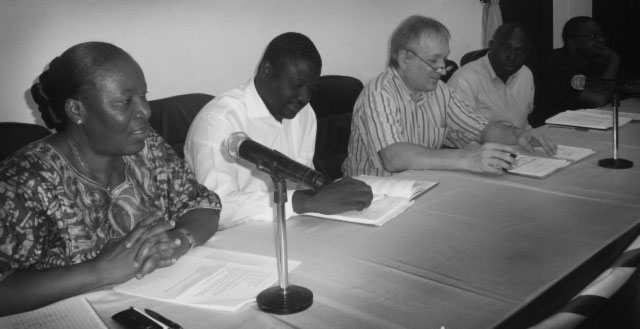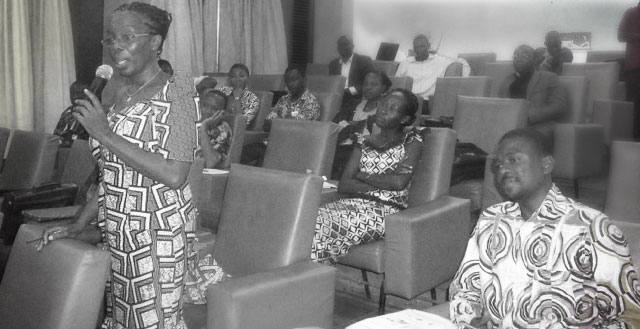Partnerships Strengthen Togo's Information System and Scientific Writing
The dream of Togo’s director general of Health, Dr. Kokou Dogbe, to transform the National Institute of Health (INH) into a comprehensive national public health institute (NPHI) that will address the major health problems of the Togolese people, continues to move closer to reality.

With IANPHI funding and pro-bono technical assistance from the French Institute for Public Health Surveillance (INvS) and Morocco’s Pasteur Institute (IPM), two important initiatives are underway to strengthen information systems and build expertise in scientific research and publication.
Faster, More Accurate Data
"Strengthening information systems is an important priority for Director General Dogbe", said Professor Mohammed Hassar, director general emeritus of IPM. “Togo’s leaders have a clear view of what they want.”
Professor Hassar, a founding member of IANPHI’s Executive Board, and Khalid Gabi, IPM information system engineer, visited INH in March 2013 to assess the current information system and make recommendations for improvements. In addition to short-term solutions, the team developed longer term recommendations on infrastructure, software, data, procedures, and training. Funding priorities identified during the visit will be supported by IANPHI and other donors.
“Information systems and technology are necessities today," says Professor Hassar. “They help us react faster, and that’s the most important thing when there’s an outbreak. Survival without their extensive use is inconceivable in 2013.”
The benefits of a system-wide approach include collecting more accurate and timely data on disease threats, allowing for faster responses to disease outbreaks and more accurate, evidence-based decision making at all levels of government.
IPM has pledged continuing support and mentoring to include on-site technical assistance in Togo, visits to Morocco to study IPM platforms and systems, an internship for a newly hired INH information specialist, and help in identifying other partners and donors to support implementation of the information systems plan.
“Information systems make it possible to use real-time data when making decisions and to respond in real time to patients, suppliers, policy makers, and the media,” adds Professor Hassar.
Strengthening National Capacity for Evidence-based Policy
Augmenting INH’s improved information system, which will expand opportunities for researchers through videoconferencing and improved access to online libraries, was an April training on scientific research and publication for 19 West African scientists.
Spanning a range of disciplines and affiliations – epidemiologists, biologists, and laboratorians representing academia, public health, and community care in Togo and neighboring Cote d’Ivoire – their diversity of experience was ideal for network building. All wanted to learn the basic principles of scientific writing and publish findings that could influence policies in their countries.
“They are doing good work and it’s important that they share that work through publications,” says Dr. Jean-Claude Desenclos, deputy director for science of France’s INvS, who facilitated the seminar along with Dr. Didier Ekouevi from the University of Lomé and Adjane Koura, quality manager at the National Blood Transfusion Center of Lomé, who did his Humphrey Fellowship practicum at the IANPHI U.S. office.
The seminar used case studies relevant to Togo and Cote d’Ivoire to illustrate approaches to scientific research and publication. “It was important to understand the priorities in the country,” says Dr. Desenclos.
"I attended the seminar because I needed to strengthen my skills in scientific writing", said one of the participants to the seminar, Dr. Lochina Feteke who is interim director of Togo's National Blood Transfusion Center. "With these newly acquired skills I will implement research projects that will lead to articles published in 12 to 18 months. It is important for my work in public health and my academic career." Dr. Feteke is working with three other seminar participants on a hematological profile of sickle cell disease
Over the next 12-18 months, teams of junior and senior researchers will work on five protocols—with the goal of publishing their research on prevalence of hepatitis B in 15- to 25-year-olds, menstrual hygiene, prevalence of HIV and syphilis among sex workers and their clients, blood profiles of patients with sickle cell, and gastroenteritis in the Savannas. IANPHI will help underwrite future data collection, analysis and policy development.

Everyone Benefits
Through this unique model of NPHI-to-NPHI technical assistance, IANPHI facilitates sustainable institutional capacity-building as well as connections among leaders and staff in member institutes.
“I give my time because it is an important part of our public health mission to share our experience through a network of public health institutes with the same values (good science to influence public health decisions),” says Dr. Desenclos, who also has mentored Togo INH Director Dr. Banla for the past two years as part of IANPHI’s mentorship program funded by David Heymann. “It’s quite exciting to share this experience with public health professionals with different national, institutional, and cultural backgrounds. We learn from each other’s experience.”
Professor Hassar says he always learns something during a partnership outreach. “You discover things that you haven’t gone through, and you can help other countries find a solution for less cost because you have already had this experience in your country. Networking is very important, and north-south-south collaborations like these bring together people with very different levels of expertise.”
“We are here in Togo as a catalyst to help them,” Professor Hassar concludes. “We are not in an isolated world anymore—in terms of disease, human migration, transportation, health, everything—so everyone benefits from working together.”